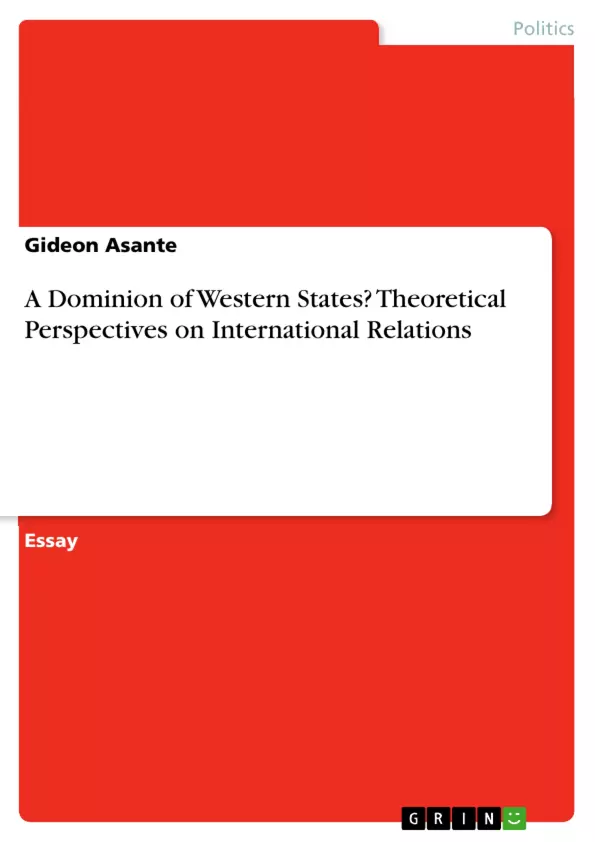The purpose of this paper is to discuss the view that International Relations continue to be the domain of a few powerful Western States.
In doing so, the paper is divided into three sections. The first section explains the concept of international relations and the theoretical perspectives of liberalism and realism on international relations. The second section discusses the following; World/Power politics, UN Security Council and the Bretton Wood Institutions to support the view that International Relations is dominated by a few powerful Western States.
The final section concludes the essay.
Inhaltsverzeichnis (Table of Contents)
- Introduction
- The International System
- Theoretical perspectives
- Realism
- Liberalism
- World Politics
- The United Nations Security Council
- The Bretton Woods Institutions
- Conclusion
- References
Zielsetzung und Themenschwerpunkte (Objectives and Key Themes)
This essay aims to explore the dominance of powerful Western states in the realm of international relations. It examines the international system, its actors, and the theoretical perspectives of liberalism and realism as they apply to this concept. The essay also delves into the influence of Western states in various areas of world politics, including the United Nations Security Council and the Bretton Woods Institutions.
- The role of nation-states and other actors within the international system
- The theoretical frameworks of liberalism and realism in understanding international relations
- The influence of powerful Western states on global politics
- The impact of international organizations like the UN Security Council and the Bretton Woods Institutions
- The concept of sovereignty and its implications for international relations
Zusammenfassung der Kapitel (Chapter Summaries)
- Introduction: The essay introduces the concept of international relations and its focus on the dominance of Western states. It outlines the structure and purpose of the essay, dividing it into three sections.
- The International System: This chapter explores the nature of the international system, emphasizing the role of nation-states, international organizations, and private actors. It discusses the concept of sovereignty, the evolution of the state system, and the various levels of analysis within international relations.
- Theoretical perspectives: This chapter delves into the dominant theoretical perspectives in international relations, particularly realism and liberalism. It examines the key assumptions, strengths, and weaknesses of each theory, highlighting their implications for understanding international relations.
- Realism: This chapter provides an in-depth analysis of realism, focusing on its core assumptions and how it views the state as the primary actor in international affairs. It explores the realist view of international relations as an anarchic system where states are driven by self-interest and power.
Schlüsselwörter (Keywords)
Key terms and concepts central to this essay include: international relations, nation-states, international system, sovereignty, liberalism, realism, world politics, power politics, United Nations Security Council, Bretton Woods Institutions, Western states, international organizations, NGOs, transnational corporations, levels of analysis.
Frequently Asked Questions
Is International Relations dominated by Western States?
The essay explores the view that powerful Western states continue to dominate the international system through key institutions like the UN Security Council and the Bretton Woods Institutions.
What is the difference between Realism and Liberalism in IR?
Realism views the state as the primary actor in an anarchic system driven by power and self-interest. Liberalism emphasizes cooperation, international organizations, and the role of non-state actors.
What are the Bretton Woods Institutions?
They include organizations like the World Bank and the IMF, which are discussed in the paper as examples of Western influence over global economic policy.
What role does the UN Security Council play in power politics?
The essay analyzes how the structure of the UN Security Council reflects and reinforces the dominance of a few powerful states in world politics.
Who are the main actors in the international system?
Besides nation-states, the system includes international organizations, NGOs, and transnational corporations, all of which influence global relations at various levels.
- Citation du texte
- Gideon Asante (Auteur), 2018, A Dominion of Western States? Theoretical Perspectives on International Relations, Munich, GRIN Verlag, https://www.grin.com/document/509727



